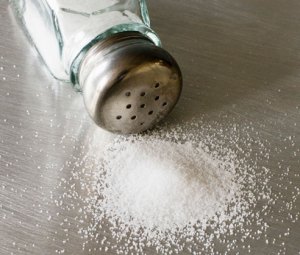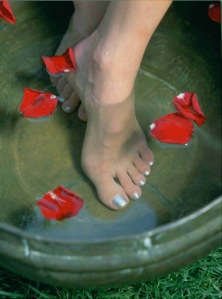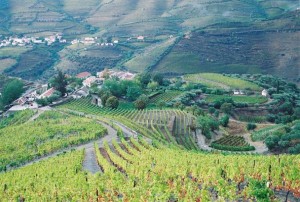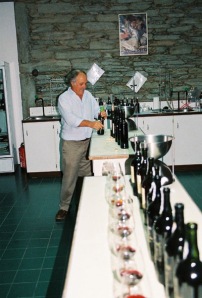Meat Loves Salt 1

When the old man looked ahead at his dwindling days he grew lonely and afraid. So he called his three daughters to him.
‘Before I draw up my final will you must each give me a gift which shows how much you love me.’
The next day the eldest daughter presented him with a bejewelled crown.
‘My love for you is as rich and bright as this crown,’ she said.
The old man placed it on his head and was reassured by its heavy weight pressing down on him.
‘I will give you a third of my wealth,’ he replied.
‘The middle daughter presented the old man with an opulent fur coat.’
‘My love is as rare as this coat.’
Her father wrapped the fur about him and was reassured by its warmth even though it stifled his breathing.
‘I will give you a third of my wealth,’ he said.
Finally the youngest daughter approached. She handed him a small and simple paper bag.
The old man grabbed it, full of anticipation, sure that this gift from his favourite daughter would be the greatest of the three. He poured out the contents, then stood shocked, open mouthed, as a pile of white salt streamed into the palm of his hand.
‘What does this mean?’
‘I love you like meat loves salt,’ the youngest girl said.
The two elder girls sniggered and the old man grew angry.
‘Salt! How dare you! Get out of here you ungrateful wretch. Leave my house now if this is how much you love me then I care nothing for you.’
That evening the old men was bad tempered as he ate his dinner alone. He missed his youngest daughter, as she usually kept him company in the evening. His new crown was too heavy and the fur coat was itchy against his skin. He also had a sneaking feeling that he looked ridiculous.
He stabbed at the meat on his plate and started to chew. It was bland and unpalatable.
‘Salt,’ he cried. ‘I need salt.’
Then he fell silent and realised how very, very foolish he had been.
When he looked up there was somebody standing in front of him, it was his youngest daughter, she was holding a salt cellar out to him.
‘I love you like meat loves salt,’ she said.
‘Yes,’ he replied. ‘I love you like meat loves salt.’
Like Meat Loves Salt II
When the waitress offers the woman seated at a table in the corner of the restaurant a drink she just shakes her head. Ten minutes later she asks again but receives the same response. The woman doesn’t fidget and fiddle with the cutlery or glance at her watch or look up every time the door opens, she just sits, hands in lap, looking at the white cloth. Another ten minutes pass. The restaurant is busy now, the bustle of a Thursday night.
Then suddenly the door is flung open and a man rushes in. He is tall, middle aged, wearing an expensive wool coat, bejewelled with beads of rain. He doesn’t pause at the reception desk but rushes into the dining room and falls on one knee in front of the seated woman.
‘I’m so sorry. Something came up. I’m so sorry.’
The woman looks at him and gives him a small resigned and lifeless smile. The man stands up and shrugs off his coat and drapes it over the chair then calls to the waitress.
‘A bottle of Champagne please. Your best.’
‘You don’t have to,’ the woman said. ‘It doesn’t matter.’
‘Of course it matters, it’s our anniversary and it’s the first time you’ve been out since….’
The waitress brings the bottle of champagne. They clink glasses then silence falls between them. And now they both stare at the cloth. There is nothing to say. Then the man picked up the salt cellar and let the salt stream out and he draws the shape of a heart. The crystals are a glistening white against the matt starch of the cloth.
‘I love you like meat loves salt,’ he says.
The woman gasps.
‘You remember!’
‘Of course, I remember everything. I remember your face, so beautiful twenty-five years ago when I lifted up your veil and kissed you as my wife for the first time. I remember the first time I saw you dancing and I was too afraid to speak to you. I remember when you were lying in the hospital bed…’
The woman gasps again. But the man continues to speak.
‘Holding our children for the first time. I remember how you grew and changed from a girl to a woman. And I remember how just a few weeks ago again seeing you lying in a hospital bed, just waking up, and how I was still amazed at how beautiful you are.’
The woman puts a hand to her breast and slowly tears fall down her cheek. She cries silently and he leans over and kisses her face. Her tears taste salty. Then she picks up the salt cellar and draws a heart that intertwines with his.
‘I love you like meat loves salt,’ she says.
Then they both put their index finger into the salt and lick it off.
Then somehow, it was a stupid mistake, an accident, when the woman licks the salt she bites her lip and it starts to bleed. Blood flows out and run down her chin. She tries to check the flow with her napkin but it won’t stop.
‘Darling, are you alright?’
‘I should go to the bathroom’, she says, but she is unable to move.
‘Come, let me help you,’ her husband helps her out of her chair. The waitress watches them and is shocked to see such grief.
In the bathroom the woman washes her face. The man strokes her hair and then he holds her to him. She isn’t crying any more. He starts to kiss her tasting her blood and some grains of salt that still linger on her skin. Slowly she starts to kiss him back. It has been a long time. They rediscover the shape of the others mouth, teeth and tongue, once to familiar, so sweet to remember.
Then they start to kiss harder and the man runs his hands over her back. Then he unzips her dress.
‘Don’t I’m too…’
‘Sssh. I love you like meat loves salt.’
Now her sobbing comes from deep in her throat. And she holds the sides of his head and tips her own against the back of the wall.
‘No’, she cries as he undoes her bra. ‘No.’
‘Ssh’ he says again as the soft, liquid filled rubber that fills the left cup falls to the floor with a thud. ‘Ssh.’ Then he licks the scar where her left breast had been and she throws her body back against the wall as she feels his lips tingle against her. He cups her right breast and he slowly kisses the skin flat against her ribs just above her heart. She grips on to him tightly and wraps her legs around him. When he pushes inside her her body thuds against the wall.
‘I love you…’ she cries.
‘Like meat…’ he gasps in reply.
Her back thuds against the wall again.
‘Love salt’
‘Like meat,’ he says.
‘Loves salt,’ she whispers.
Thud.
‘Meat.’
‘Salt’
Thud.
‘Meat.’
‘Salt.’
Thud.
‘Salt. Salt. Salt.’
When they return to table the waitress looks at them. She had heard the thudding and drawn the obvious conclusion but she couldn’t believe that this respectable middle aged couple would do such a thing. Then she sees the woman’s face, gone is the grey pallor, the stillness, here is a person full of life. Full of hope.
‘Do you need anything?’ she asks the couple.
‘No thank you. We have everything we want,’ the woman smiles at the girl, the smile reaches her eyes, and then she turned to her husband.
‘Yes,’ replies the man, ‘we have everything we want.’
They reach out their hands to each other across the table.
www.katrinaalloway.co.uk
On a recent trip to the Douro I discovered that crushing grapes by foot is still in full swing, however it’s not Port that’s being made but still wines and I thought they were delicious.

If you need some extra special pampering then wrap your toes in rose petals and have a glass of Douro wine.
My friend Stephanie and I recently had a conversation about the ultimate pedicure. We debated various potions and unguents then Stephanie suggested having each toe individually wrapped in a rose petal. I think that sounds perfect and the only way that this could be improved upon would be to drink an excellent glass of wine at the same time.
One group of people whom I feel are deserving of such pampering (although I am first in the queue) are the grape crushers in the Douro Valley, Portugal. I recently visited the Douro and found out more about crushing grapes by foot than I ever expected to know short of jumping in the vat and paddling about myself.
The Douro is the only place where fruit is still crushed by the human foot (Unless there’s somewhere I haven’t heard of?). Grapes are put into huge concrete baths called lagars and then the crushers get in and set to work. It is easy to assume that immediately a bacchanalian free-for-all ensues.
‘Not so’, says João Nicolau de Almeida, lead winemaker for Ramos Pinto. ‘People have to follow the controller. For the first two hours it is like a military march, very slow, very strict, they have to make sure all the grapes are crushed. Then we all have a glass of wine, the music starts and people can dance and enjoy themselves. The guy playing the accordion has to understand how people need to move to make sure all the grapes are crushed and macerated. Sometimes people form a train, other times they have to go backwards or right into the corners. The different dances and movements ensure that there is the right amount of pressure and the right amount of movement. But all of this is empirical knowledge; it is not something that has been scientifically researched.

Quinta de Bomfin - it was a rare treat to stay in such a beautiful Quinta.
In this age where most wineries look like computerised factories there is something folksy and quaint about foot crushing and dancing to accordions. However what surprised me most was not that this tradition continues but that it has been adapted for a relatively recent development: these dancing feet are not only making ports for which the Douro is renowned, but also still wines (i.e. around 13-14° alcohol). Most Quinta (that’s winery in Portuguese) have only started making non-fortified wines in the last decade so it is surprising that they have chosen to continue with this labour intensive method when the rest of the wine-making world advocates hands-off (never mind feet) techniques.
‘Foot crushing is a more gentle method and it is part of our Bacchus culture. It is unique to the Douro. We like it here,’ says João Nicolau de Almeida with a smile under him moustache.
Over the river is Quinta do Crasto a winery that dates back to 1615. They have also embraced still wine making and have five different bottlings.
‘Table wine is becoming more important each year,’ explains owner Miguel Roquette. He is kindly taking me for a bit of a wander around his vineyard, one day I’d like to come back here and hike the Douro properly, but for the moment I’m content with gazing at the stunning views of the terraced vineyards.
Some of these plots of vines are pre-phyloxera. Most are such a salmagundi of varieties that Roquette jokes they are like a ‘fruit salad’. I also heard wines made from this haphazard mix of grape varieties referred to as a ‘field blend’.
My two favourites wines were Vinha Maria Teresa 2007 and Vinha da Ponte 2007. They are both field blends, hand picked, foot crushed and hand plunged. Vinha Maria Teresa is dark and tarry on the nose with very juicy, cherry and leather notes on the palate. The tannins are nice and soft but still quite obvious; this wine has bags of ageing potential.
The Quinta only made 3,000 bottles of Vinha da Ponte in 2007 so it is a real treat to get to taste it. This is softer than Maria Teresa with lots of raspberry and chocolate flavours. It is a very complex, sophisticated wine.
What I liked about both of these wines is they are not obvious flavours because the ‘field blend’ means that each wine has an individual and unique character. In a world where so many wines can be monosyllabic and ‘do what they say on the tin’ I think this is very refreshing.
Another ‘field blend’ favourite was the toothsome and spicy Quinta de Griche 2007 from Churchill Estates. I’d hoped to visit the Quinta but a dramatic thunder-storm over night meant the road was impassable. So I met up with owner Johnny Graham and winemaker Maria Emilie Campos in a fancy restaurant instead. (Tough!) As they’d also had their harvest party the night before which had included some serious dancing in the lagars they had clearly had a night to remember. If they were worse for wear then it wasn’t showing.
Maria Emilie suggested we ordered the salt cod and also surprisingly suggested red Quinta de Griche 2007 to go with it. They made a terrific partnership both as both were robust, full flavoured and generous.
However I think my most memorable wine from the trip was one made at Quinta de Bonfim called Duas Quintas, Special Reserva ’07.
‘I made this in a special way. It is crushed in the lagar, no filters are used and it is aged in a large barrel called a tonel’, explains João Nicolau de Almeida.

How much wine does João Nicolau de Almeida expect me to drink? Oh alright then...
The wine is very dark and smoky on the nose with liquorice, spice and herb notes. It is very savoury and meaty with big tannins.
‘I was researching for a book I co-wrote called Porto Vintage[1] and I discovered how wine would have been made here 300 years ago. I followed their methods and made Duas Quintas. It is half way between a wine and a port,’ says João.
I’ve read quite a lot on the history of wine and always thought that it is impossible to know how wines would have really tasted, but Duas Quintas is probably as close a replication as it gets. (They drank some good stuff in the seventeenth century!) What it also proves is that the Douro has always evolved and that arguably the ports we know today are not the original wines, meaning that today’s adaptation i.e. table wines are simply the latest incarnation in an on-going development.
I really liked these contemporary Douro wines, I think they’ve got character and are well adapted to modern tastes and drinking habits. However the fact that they are still foot crushed proves that they are very much in-keeping with their region’s viticultural history. I think this demonstrates that winemakers here have a healthy respect for tradition all the while keeping an astute eye on what consumers want. I’m sure that Douro still wines will be around for a while and will probably adapt further. I intend to follow their progress with interest.
For the moment though I’m going to drink a glass of Quinta do Vesuvio 2007 from Symington Family Estates and pamper my feet by wrapping my toes in rose petals. Just a whim of mine.
[1] Porto Vintage Gaspar Martins Pereira and João Nicolau de Almeida, Instituto do Vinho de Porto, 2002.




